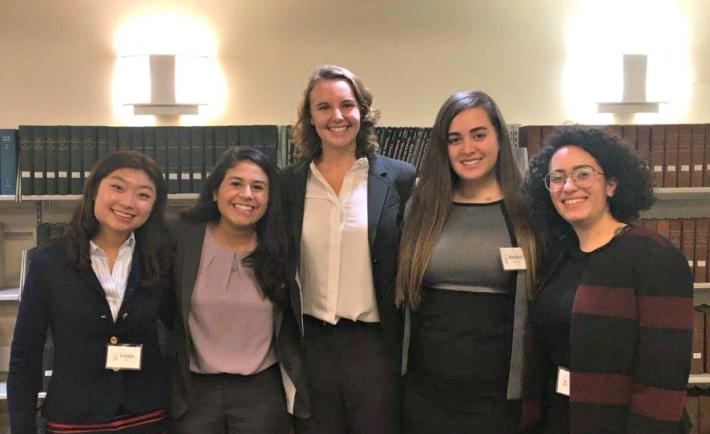
This multidisciplinary group from the Madeleine K. Albright 2017 Fellowship at Wellesley College comprised two economists, an environmental scientist, a mathematician and a neuroscientist and presented on trade-induced inequalities.
Throughout the past 10 weeks as a Madeleine K. Albright fellow with the Gender, Women and Democracy team at NDI, I have had the opportunity to bring together my two passions: neuroscience and politics. When people think about gender inequality, they very rarely think about the effects that it has on a cognitive level. In fact, the gap between the natural and social sciences has grown so wide that advancements in both fields, which could benefit one another, end up lost within their specific bubbles. Bridging the gap between these two fields makes us all better equipped to tackle the greatest challenges that affect humanity. Though here I focus particularly on women, this analysis has both an inclusion and intersectional perspective to it, and it can encompass other marginalized and oppressed groups in communities and societies around the world - for example, ethnic and religious minorities, LGBTI groups, and those who have been forcibly displaced.
Gender inequality is deeply rooted within societies. In fact, Spike Peterson, in her thesis “The Archeology of Domination” (summarized in the linked article), emphasizes that the root of gender inequality extends as far back as the foundation of society; she refers specifically to the transition of Western societies from being nomadic peoples to agricultural peoples. Peterson discusses the fact that society is founded in the distinction between private and public life, which can be restated as the distinction between women and men. This distinction can be perceived in all aspects of society, but I will use economics as an example.
In the field of economics, the only variables that actually contribute to GDP -- or in other words, the only work that is considered to be relevant -- are those that are found within the public sphere (dominated by men). We completely exclude all the work that is done in the domestic sphere (dominated by women). The hours and energy that mothers and women put into the management and upkeep of the household are not considered worthy enough contributions to society to be integrated into our economic systems. This is just one example of how these fundamental differences are deeply rooted in the structure of our societies.
This inequality contributes to the hurdles in any given woman’s life. The fields of development and social science address these hurdles at length - from girls’ education, to all forms of violence against women, to women’s economic empowerment, to women’s political participation, and so on. Still, the gap with the natural sciences has not been bridged so that we think about the cognitive impact that such experiences have on women. This is not to say that neuroscience or cognitive sciences have not tackled social issues, just that there is still a significant gap in the literature. Therefore, I would advocate for an investment of time, energy, and resources in conducting more extensive research regarding the cognitive impacts of gender inequality - which is so deeply rooted in all factors of life - on both men and women.
Similar to the work that was done with regards to the harmful impact of poverty on cognitive development, it would be interesting to explore scientifically the harmful ways gender-based discrimination might impact a woman’s cognitive functions. Adding this scientific knowledge to all of the work that has been done in the social sciences would allow for a deeper and more contextualized understanding of the impact of gender inequality.
Bridging the gap between the natural sciences and the social sciences can begin with international organizations or consulting firms who build relationships with academic institutions and researchers. They should begin tackling the issues together, similar to what Beyond Conflict has done with the Saxe Lab at MIT regarding Conflict Resolution. Researchers there are exploring behavioral and neural responses to the presentation of the conflict and different forms of conflict resolution attempts.
While the focus of this article is gender inequality, and how cognitive science and social science will allow for a better understanding of what women experience when they are discriminated against, this idea can help frame other challenges for humanity. For example, understanding how the cognitive impact of forced displacement influences an individual's agency will enhance democratic assistance programs in communities of internally displaced people. When social sciences and natural sciences are combined, they allow for a greater understanding of some of humanity’s greatest obstacles, and therefore allow for more effective and sustainable solutions.
